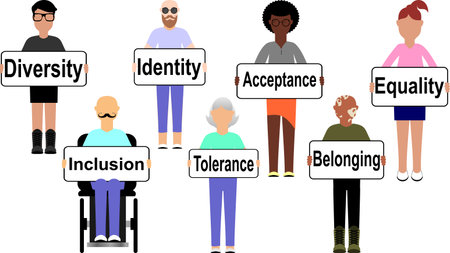Introduction: Understanding the British Social Gap
Britain is a nation often celebrated for its rich heritage, charming countryside, and iconic cultural traditions. Yet, beneath the surface of this collective identity lies a complex web of social barriers that shape everyday interactions and personal relationships. These barriers are not always overt; they can be found in the classic stiff upper lip attitude—a quiet resilience often mistaken for emotional reserve—as well as in the more nuanced distinctions of class, accent, and background. From the subtle codes of politeness to the invisible lines drawn by postcode or education, British society has long grappled with maintaining unity while respecting difference. Understanding these roots and manifestations is essential for anyone seeking to foster genuine connection and inclusivity within their community. In this article, we will explore how self-reflection can become a gentle yet powerful tool for bridging these social divides, inviting us all to mind the gap not just on the Underground, but in our hearts and minds as well.
2. A Cuppa and Conversation: British Ways of Connecting
In the United Kingdom, building bridges across social divides has always involved a unique blend of tradition and gentle innovation. One of the most cherished customs remains the simple act of sharing a cup of tea—affectionately called “a cuppa.” This ritual is more than just enjoying a hot beverage; it’s a subtle invitation to pause, reflect, and open up. Whether at home or in the workplace, offering someone tea is a sign of welcome and a first step towards heartfelt conversation.
The Role of Tea Rituals
The humble teapot has long been a silent facilitator of social interaction. In many households, brewing tea is an act that brings people together around the kitchen table, encouraging relaxed dialogue. Even in moments of awkwardness or emotional distance, putting the kettle on serves as an olive branch, allowing space for reflection and gentle connection.
| Traditional Setting | Modern Adaptation |
|---|---|
| Home-based afternoon tea with biscuits | Coffee shop meetups over herbal teas |
| Workplace tea rounds (offering colleagues a brew) | Virtual tea breaks via video calls |
| Neighbourhood tea parties during local events | Tea subscription boxes shared among friends |
The Local Pub: A Community Hub
If tea provides comfort and familiarity, the local pub offers another dimension to British connection. Traditionally viewed as the “heart” of many communities, pubs are spaces where people from diverse backgrounds can gather on equal footing. Here, casual chats over pints break down barriers that might otherwise seem insurmountable elsewhere. The pub’s relaxed atmosphere encourages openness, fostering genuine exchanges that build trust and camaraderie.
Pubs Versus Private Spaces: Comparing Social Dynamics
| Aspect | Pubs | Private Homes/Tea Settings |
|---|---|---|
| Openness to Strangers | High – Encourages meeting new people | Lower – Often limited to invited guests |
| Conversation Topics | Diverse – Ranges from sports to local news | Personal – Family matters or shared interests |
| Formality Level | Informal and relaxed | Mildly formal depending on occasion |
| Opportunity for Reflection | Spontaneous self-disclosure encouraged by setting | Facilitated through ritual and comfort food/drink |
Nurturing Genuine Interaction Through Tradition and Change
The British approach to overcoming social barriers is rooted in these familiar rituals but continues to evolve. Modern adaptations—like virtual gatherings or inclusive events—blend seamlessly with age-old customs, making it easier for individuals to connect while respecting personal boundaries. By appreciating these nuanced methods, we can better understand how self-reflection and community go hand-in-hand, creating opportunities for authentic connection in both traditional and contemporary Britain.

3. The Power of Politeness: Language, Humour, and Boundaries
Politeness is often referred to as the backbone of British social interaction, a subtle force that shapes conversations and daily encounters. Whether you are navigating a local market or joining colleagues at the pub, the language you choose—softened with “please,” “thank you,” and “sorry”—can gently open doors or quietly keep them closed. This careful use of words is more than just good manners; it’s a quiet invitation to connect while also maintaining a comfortable distance.
Understated humour, another hallmark of British culture, weaves its way through these exchanges. Dry wit, gentle self-deprecation, and clever wordplay can serve as icebreakers, helping strangers find common ground without overstepping boundaries. Yet, for those unfamiliar with this style, such humour may feel elusive or even isolating. Recognising when to join in—and when to step back—requires attentive self-reflection and an openness to learning from others’ cues.
Equally important is the respect for personal boundaries. In Britain, giving others space—both physically and emotionally—is often seen as a sign of respect rather than aloofness. Understanding these unspoken limits allows us to avoid misunderstandings and fosters genuine connections built on trust and consideration. By becoming more aware of how our words, humour, and presence impact those around us, we can begin to bridge social gaps with warmth and authenticity.
4. Self-Reflection in a British Context
To truly mind the gap and overcome social barriers in Britain, self-reflection must be more than a passing thought; it should become a gentle daily practice. The British cultural landscape—with its understated manners, love of queuing, and famous “stiff upper lip”—can sometimes make it tricky to recognise when we are letting unspoken assumptions or inherited social habits shape our interactions. By carving out time for mindful self-reflection, we can begin to notice our own biases, preconceptions, and the subtle ways we might unintentionally reinforce divides.
Everyday Mindfulness Practices
Practising self-reflection doesn’t require grand gestures; it’s about slowing down and tuning in. Here are a few simple, natural ways to foster awareness:
| Practice | Description | British Cultural Example |
|---|---|---|
| Journaling | Write down daily observations about your reactions and feelings during social encounters. | Note how you felt joining a new group at work, or how you responded to small talk in the queue at the local shop. |
| Mindful Pause | Take a moment before responding in conversation to consider if any assumptions are guiding your words. | Before commenting on someone’s accent or background, pause to reflect on why it stands out to you. |
| Cultural Curiosity | Intentionally seek out opportunities to learn from those with different backgrounds. | Attend community events outside your usual circle—like a Diwali celebration or local Caribbean food festival—and notice your initial thoughts. |
Nurturing Openness and Empathy
The British tradition of politeness is a double-edged sword: while it fosters civility, it can also hide discomfort or disagreement under the surface. Through gentle self-inquiry—asking ourselves questions like “Why did that situation feel awkward?” or “Am I making assumptions based on someone’s appearance or accent?”—we open doors to deeper empathy. This honest reflection helps us move beyond automatic responses shaped by societal norms and towards genuine connection.
Questions for Gentle Self-Inquiry
- When did I last feel hesitant to speak up? Why?
- Do I gravitate toward people with similar backgrounds at gatherings?
- How do I react when faced with unfamiliar traditions or viewpoints?
- Can I spot patterns in my behaviour that echo wider social divisions?
A Pathway to Change
Cultivating these mindful habits aligns with the British appreciation for quiet resilience and thoughtful consideration. Over time, such practices not only nourish our own wellbeing but ripple outward, helping bridge the social gaps that quietly persist across neighbourhoods, workplaces, and communities throughout the UK.
5. Everyday Actions for Bridging Social Divides
Building a more inclusive and connected society doesnt require grand gestures—it often starts with the small, mindful choices we make each day. In Britain, where understated politeness and an appreciation for personal space are woven into the social fabric, fostering inclusivity can be as simple as acknowledging others with a warm smile or initiating a gentle conversation while waiting for your morning bus. These everyday actions help to soften invisible barriers, allowing us to appreciate the richness of our communities.
Start Small: Friendly Encounters
Whether you’re queuing at the local chippy or taking a stroll through your neighbourhood park, consider offering a friendly “Good morning” or engaging in light chat about the weather—an ever-reliable British icebreaker. These brief moments of connection remind us that everyone belongs, no matter their background.
Appreciate Diversity at Work
In the workplace, showing curiosity about colleagues’ traditions—perhaps sampling a homemade treat they’ve brought in or asking about their favourite holiday—can foster understanding and respect. Inclusive workplaces thrive when everyone feels seen and valued, so don’t hesitate to champion diverse perspectives during meetings or team lunches.
Practice Active Listening
True inclusivity comes from listening as much as speaking. When someone shares their story or perspective, offer them your full attention without judgment. This simple act builds trust and bridges divides, one conversation at a time.
Cultivate Empathy Through Reflection
Take a moment each day to reflect on your own assumptions or reactions to those who may seem different from you. Self-reflection helps us identify unconscious biases and encourages us to approach new interactions with openness and kindness—a cornerstone of British community spirit.
By weaving these gentle habits into daily life, we can all play a part in narrowing social gaps and creating spaces where everyone feels welcome. It’s through these small steps—rooted in genuine curiosity and care—that lasting change begins.
6. Conclusion: Nurturing Authentic Connections
As we journey through the intricate landscape of British social life, it becomes clear that self-awareness and open-mindedness are vital tools in overcoming longstanding barriers. Understanding our own responses, assumptions, and cultural habits is the first step towards bridging the gaps that so often keep us apart. By taking a gentle pause for self-reflection, we can notice where tradition serves us and where it might be holding us back from genuine connection.
Embracing small, conscious changes—like inviting someone new for a cup of tea or simply listening more attentively—can ripple outwards, creating space for warmth and understanding in everyday encounters. These modest shifts don’t require grand gestures; rather, they invite us to show up as our most authentic selves while honouring the unique richness of British social traditions.
Let’s remember that meaningful change often starts with a single step. By nurturing curiosity about others and compassion for ourselves, we foster a kinder community spirit—one where every gap becomes an opportunity for growth and friendship. Mind the gap not only on the platform, but also in our hearts and minds: together, we can build lasting connections that truly enrich our lives.


